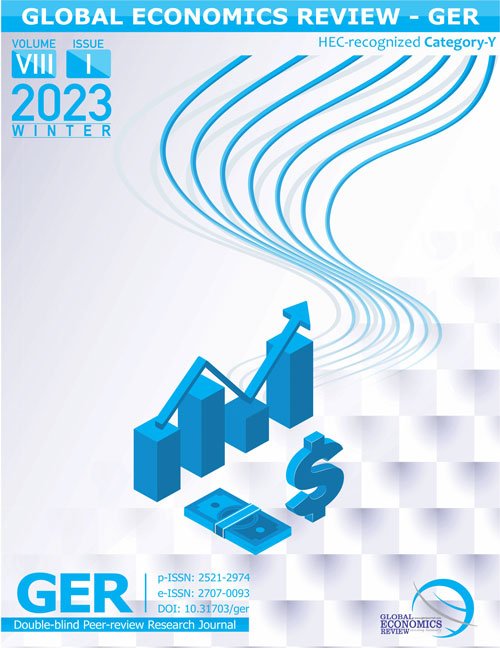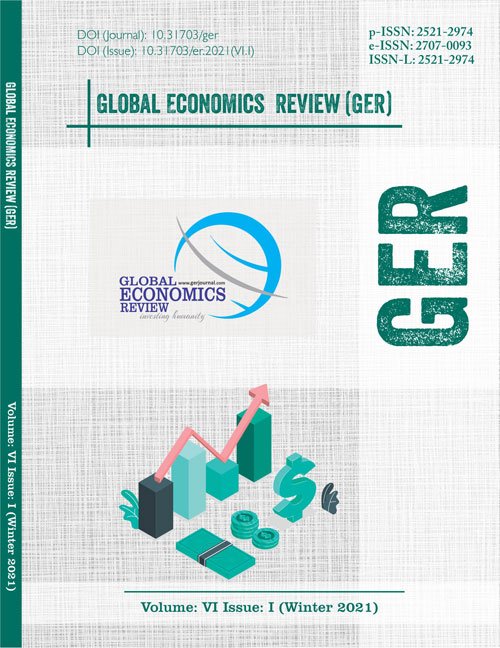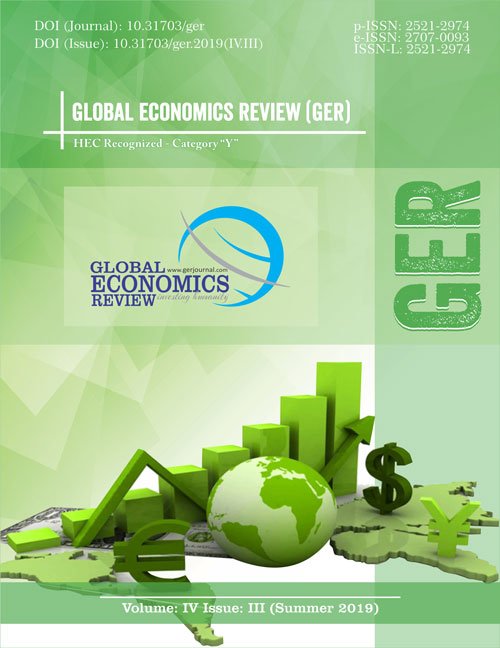01 - Reshaping the Financial Landscape through Fintech and Digital Finance
http://dx.doi.org/10.31703/ger.2024(IX-I).0110.31703/ger.2024(IX-I).01 Published : Mar 2024
-
This article offers a comprehensive examination of the research conducted on the effects of digitalization on the ability to get financial resources. Our primary emphasis is on providing access via the use of financial technology. This article examines the progression of three prominent financial technology advancements: crowdfunding, initial coin offerings, and fintech lending (which encompasses ... Details
-
Digitalization, FinTech, Capital, Intermediation, Asymmetries
-
(1) Hira Tanvir
MSc FinTech, Imperial College London, England.
(2) Samia Manan
Lecturer, Department of Economics, University of Chitral, Chitral, KP, Pakistan.
02 - Impact of Tariff and Non-Tariff Barriers on Pakistanââ¬â¢s Exports: A
http://dx.doi.org/10.31703/ger.2024(IX-I).0210.31703/ger.2024(IX-I).02 Published : Mar 2024
-
The current study analyzes the impact of tariff and Non-Tariff Barriers (NTBs) on exports of Pakistan with its partner countries at aggregated as well as disaggregated level. By employing the Gravity Model of Trade with Fixed Effects methodology controlling for country, product and time fixed effects, the study utilizes panel data from Pakistan and 191 other countries for the period 1995-2017. The... Details
-
Trade, Tariff And Non-Tariff Barriers, Fixed Effects, Gravity Model
-
(1) Usama bin Shuja
Graduate Scholar, Department of Economics, University of Punjab, Lahore, Punjab, Pakistan.
(2) Arslan Tariq Rana
Assistant Professor, Department of Economics, University of Central Punjab, Lahore, Punjab, Pakistan.
(3) Waheed Ahmad Khan
Associate Professor, Department of Political Science and International Relations, University of Central Punjab, Lahore, Punjab, Pakistan.
03 - Nexus between Human Capital Resiliency and Supply Chain Resiliency: A Phenomenol
http://dx.doi.org/10.31703/ger.2024(IX-I).0310.31703/ger.2024(IX-I).03 Published : Mar 2024
-
All nations, communities, organisations, and people are affected by a complex and dynamic business environment. Threats from this unpredictable environment might emerge from within or outside an organisation and vary in frequency and degree. Creating a resilient system overall can fix that. This research seeks to understand how human capital and the supply chain share crisis resilience. A descript... Details
-
Disruptions, Resilience, Human Capital, Supply Chain Resilience, Phenomenological Study
-
(1) Syed Aamir Alam Rizvi
Research scholar, Institute of Business Management, Karachi, Sindh, Pakistan.
(2) Mohsin Ali
Lecturer, National Textile University, Karachi Campus, Karachi, Sindh, Pakistan.
(3) Hasan Raza
Assistant Professor, Department of Commerce, University of Karachi, Sindh, Pakistan.
04 - Exploring Sustainable Economic Strategies for Pakistan: Breaking Dependency on I
http://dx.doi.org/10.31703/ger.2024(IX-I).0410.31703/ger.2024(IX-I).04 Published : Mar 2024
-
The objective of this research is to find a viable and sustainable economic vision for Pakistan. Stresses the need to reduce dependence on assistance from the International Monetary Fund. This research acknowledges past dependence on the IMF and explores alternatives that support independence and stability in the financial system. This study looks at these countries that have successfully achieved... Details
-
World Bank, UNDP, Economic Strategies, Policy Recommendations, Sustainable Development, Domestic Policies, Sovereignty, PIDE
-
(1) Rameen Afzal
Undergraduate, Department of Political Science & International Relations, Government College Women University, Faisalabad, Punjab, Pakistan.
(2) Tayba Anwar
Lecturer, Department of Political Science and International Relations, Government College Women University, Faisalabad, Punjab, Pakistan.
(3) Iqra Sarfraz
Undergraduate, Department of Political Science & International Relations, Government College Women University, Faisalabad, Punjab, Pakistan.
05 - What are the Most Effective Economic Growth Engines: A Descriptive Study Focusin
http://dx.doi.org/10.31703/ger.2024(IX-I).0510.31703/ger.2024(IX-I).05 Published : Mar 2024
-
The growth of a country depends on the economic growth engines (EEGs). These EEGs vary from country to country and region to region, depending on the various factors. This study attempts to identify the most effective EEGs vis-à vis Pakistan. The study is descriptive in nature and uses the Strength, Weaknesses, Opportunity, and Threats (SWOT) approach for a time span of the last 7 years. Th... Details
-
Economic Growth Engines, SWOT, Descriptive Study, Pakistan
-
(1) Hidayat Ullah Khan
Associate Professor, Department of Economics, National University of Modern Languages (NUML), Islamabad, Pakistan.
06 - Socio-Economic Consequences of Urban Sprawl on Agricultural Communities in Bara
http://dx.doi.org/10.31703/ger.2024(IX-I).0610.31703/ger.2024(IX-I).06 Published : Mar 2024
-
Over the last few decades, urban sprawling and agricultural land consumption has been out of control in Pakistan. Pakistan is one of the most rapid urbanizing countries in South Asia. The present study examined the issue of urban expansion in Bara Kahu Islamabad Pakistan, relating the expansion of urban sprawl, loss of agricultural land, and evolution of new socioeconomic impacts on agricultural s... Details
-
Socioeconomic, Livelihood, Urban Sprawl, Agriculture, Explanatory
-
(1) Samina Younu
Mphil Scholar, Pir Mehr Ali Shah Arid Agriculture University, Rawalpindi, Punjab, Pakistan.
(2) Abid Ghafoor Chaudhry
Associate Professor & Chairman, Department of Anthropology, PMAS Pir Mehr Ali Shah Arid Agriculture University, Rawalpindi, Punjab, Pakistan.

 Volume IX, Issue III (Summer 2024)
Volume IX, Issue III (Summer 2024)  Volume IX, Issue II (Spring 2024)
Volume IX, Issue II (Spring 2024)  Volume IX, Issue I (Winter 2024)
Volume IX, Issue I (Winter 2024)  Volume VIII, Issue IV (Fall 2023)
Volume VIII, Issue IV (Fall 2023)  Volume VIII, Issue III (Summer 2023)
Volume VIII, Issue III (Summer 2023)  Volume VIII, Issue II (Spring 2023)
Volume VIII, Issue II (Spring 2023)  Volume VIII, Issue I (Winter 2023)
Volume VIII, Issue I (Winter 2023)  Volume VII, Issue IV (Fall 2022)
Volume VII, Issue IV (Fall 2022)  Volume VII, Issue III (Summer 2022)
Volume VII, Issue III (Summer 2022)  Volume VII, Issue II (Spring 2022)
Volume VII, Issue II (Spring 2022)  Volume VII, Issue I (Winter 2022)
Volume VII, Issue I (Winter 2022)  Volume VI, Issue IV (Fall 2021)
Volume VI, Issue IV (Fall 2021)  Volume VI, Issue III (Summer 2021)
Volume VI, Issue III (Summer 2021)  Volume VI, Issue II (Spring 2021)
Volume VI, Issue II (Spring 2021)  Volume VI, Issue I (Winter 2021)
Volume VI, Issue I (Winter 2021)  Volume V, Issue IV (Fall 2020)
Volume V, Issue IV (Fall 2020)  Volume V, Issue III (Summer 2020)
Volume V, Issue III (Summer 2020)  Volume V, Issue II (Spring 2020)
Volume V, Issue II (Spring 2020)  Volume V, Issue I (Winter 2020)
Volume V, Issue I (Winter 2020)  Volume IV, Issue IV (Fall 2019)
Volume IV, Issue IV (Fall 2019)  Volume IV, Issue III (Summer 2019)
Volume IV, Issue III (Summer 2019)  Volume IV, Issue II (Spring 2019)
Volume IV, Issue II (Spring 2019)  Volume IV, Issue I (Winter 2019)
Volume IV, Issue I (Winter 2019)  Volume III, Issue II (Fall 2018)
Volume III, Issue II (Fall 2018)  Volume III, Issue I (Spring 2018)
Volume III, Issue I (Spring 2018)  Volume II, Issue I (Fall 2017)
Volume II, Issue I (Fall 2017)  Volume I, Issue I (Fall 2016)
Volume I, Issue I (Fall 2016)